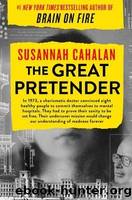The Great Pretender: The Undercover Mission That Changed Our Understanding of Madness by Cahalan Susannah

Author:Cahalan, Susannah [Cahalan, Susannah]
Language: eng
Format: epub
Tags: Psychology, History, Science, Health
ISBN: 9781538715284
Amazon: 1538715287
Goodreads: 44287149
Publisher: Grand Central Publishing
Published: 2019-11-05T08:00:00+00:00
The most concerning part, from my perspective, is that the DSM approach rendered the practice so rigid, so fixed, that the patient, the person, the human, was lost. As I would learn, this doesnât just affect the relationship between doctor and patient, but can increase misdiagnosis.
I had tested this out myself with Dr. Michael First, the man who introduced Spitzer and mentioned Rosenhan at the memorial lecture.
âIâm nervous,â I said as I turned on the tape recorder in Firstâs office. âWhy am I nervous? Have you been SCIDed yourself?â
âNope,â Dr. First said.
Dr. First is not exactly warm and fuzzyâheâs hyperclinical and a straight shooter, two things that have made him key in the creation of the last three incarnations of the DSMâbut the chunky metal ring I spotted on his finger during our interview betrays what I interpret as his softer, Woodstock-hippie vibe. He is often called upon to consult in high-profile criminal cases, recently that of the murder of six-year-old Etan Patz, which ended in a hung jury (the defendant was found guilty in a second trial). But his main contribution to the DSM world is the SCIDâthe Structured Clinical Interview for DSMâa prewritten set of interview questions designed to make a psychiatric diagnosis based on DSM criteria. I had asked if he would be open to SCIDing me about my experience with psychosis, pretending that he didnât know the diagnosis. Dr. First seemed open to a challengeâeven if the odds were stacked against him.
In 2008 he appeared on a BBC reality show called How Mad Are You? where ten peopleâfive ânormalâ and five who had been diagnosed with psychiatric conditionsâlived in a house observed by a psychiatrist (Michael First), a psychologist, and a psychiatric nurse, and engaged in a variety of tasks, including performing stand-up comedy and cleaning out cow stalls. The panelistsâ goal was to ferret out the mentally ill and correctly label them with only five days of observation. The panelists didnât do such a hot job. They nailed the guy with obsessive-compulsive disorder after watching him struggle to clean up cow manure, but incorrectly diagnosed one volunteer with bipolar disorder (where no disorder existed) and one with a history of schizophrenia (there was no history). Itâs worth recognizing how astonishingly deep Rosenhanâs thesis has cut: Despite all of psychiatryâs efforts to legitimize itself in the time since, the impossibility of distinguishing sanity from insanity had received the most mainstream of honorsâits own reality show.
First began. âOkay, Iâm going to do it straight through as if weâre doing it for real because we are doing it for real.â
He rattled off the first few questions and I answered them in quick succession: âHow old are you?â âWith whom do you live?â âHow long have you been married?â âWhere do you work?â
I explained that I had been dating my husband for seven years, but that we had met when I was seventeen. I told him about our recent marriage. He asked about work so I summarized my history at the New York Post, where I had worked for even longer than Iâd known my husband.
Download
This site does not store any files on its server. We only index and link to content provided by other sites. Please contact the content providers to delete copyright contents if any and email us, we'll remove relevant links or contents immediately.
Should I Stay or Should I Go? by Ramani Durvasula(7667)
Why We Sleep: Unlocking the Power of Sleep and Dreams by Matthew Walker(6725)
Fear by Osho(4740)
Flow by Mihaly Csikszentmihalyi(4697)
Rising Strong by Brene Brown(4459)
Why We Sleep by Matthew Walker(4445)
The Hacking of the American Mind by Robert H. Lustig(4383)
How to Change Your Mind by Michael Pollan(4356)
Too Much and Not the Mood by Durga Chew-Bose(4348)
Lost Connections by Johann Hari(4187)
He's Just Not That Into You by Greg Behrendt & Liz Tuccillo(3900)
Evolve Your Brain by Joe Dispenza(3678)
The Courage to Be Disliked by Ichiro Kishimi & Fumitake Koga(3504)
Crazy Is My Superpower by A.J. Mendez Brooks(3400)
In Cold Blood by Truman Capote(3384)
Resisting Happiness by Matthew Kelly(3341)
What If This Were Enough? by Heather Havrilesky(3311)
The Book of Human Emotions by Tiffany Watt Smith(3309)
Descartes' Error by Antonio Damasio(3279)
